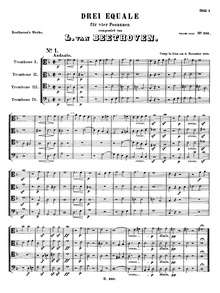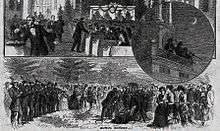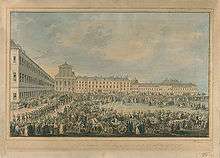Equale
An equale or aequale (from Latin: voces aequales, equal voices or parts) is a musical idiom. It is a piece for equal voices or instruments.[1][2] In the 18th century the equale became established as a generic term for short, chordal pieces for trombone choirs, usually quartets or trios. The instruments were not necessarily equal in pitch, but formed a closed consort.[3]

Commemoration of the dead

Aequales were conventionally used in Austria to commemorate the dead. They were performed from towers on All Souls' Day (2 November), and on the previous evening.[4] They were also performed at funerals.[3]
While aequales might be played by other instruments, the sound of trombones was thought to be especially solemn and noble. Trombones had also already acquired an association with death and the afterlife.[3] Finally, the theological symbolism of the trombone, representing divine presence, the voice of the angels, and the instrument of judgment, was thereby underscored.[4]
Examples

Notable examples of the genre are the three Equali for four trombones of Ludwig van Beethoven ("Drei Equale", WoO 30, see score), written for Franz Xaver Glöggl and performed in Linz Cathedral on All Souls' Day (2 November), 1812. Two of them were later performed, with the addition by Ignaz von Seyfried of words from the Miserere, at Beethoven's own funeral in 1827. They were also played as instrumental pieces at the funeral of William Gladstone in Westminster Abbey in 1898.[5]
The two Aequali in C minor of Anton Bruckner date from 1847 and are for three trombones. Three years earlier, in 1844, the little-known Wenzel Lambel (1788–1861) of Linz had published ten equali for three or four trombones.[6] Stravinsky scored In memoriam Dylan Thomas, his setting of "Do not go gentle into that good night", for tenor, string quartet and four trombones, which may be an "echo" of the tradition.[5]
References
- Sadie, Stanley (ed.) (1980). The New Grove Dictionary of Music and Musicians (Reprinted with minor corrections ed.). London: Macmillan. p. 218, volume 6. ISBN 978-0-333-23111-1.CS1 maint: extra text: authors list (link)
- Brown, Maurice J. E. "Equale". Grove Music Online. Oxford Music Online. Accessed August 2011. (subscription needed)
- Beethoven: Three Equali for Four Trombones, WoO 30 │ An die ferne Geliebte, Opus 98 │ Symphony No. 4 in B-flat Major, Opus 60 Archived 2016-12-25 at the Wayback Machine, Program notes, San Francisco Symphony Orchestra
- From sleevenotes, Triton Trombone Quartet: "German Trombone Music"; BIS-CD-644
- Bellingham, Jane. "Equale (aequale)". Oxford Companion to Music. Oxford Music Online. Accessed August 2011. (subscription needed)
- Mens en Melodie, volume 59 (in Dutch). Uitgeverij Het Spectrum. 2004. Accessed August 2011.